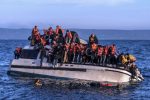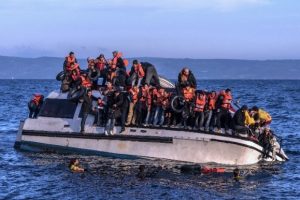People on the Move

By John Battle, Commission Chair
Our human story has always been a story of ‘people on the move’ as is well reflected in both the history of evolution and the Biblical tradition. Initially people are thought to have emerged from the Rift Valley in Africa some 2 million years ago (though anthropologists today recognise some 15-20 different species of early humans, some arriving in Europe between 1.5 and 1million years ago.).
This migratory story is reflected in the biblical narratives not least as memories of famines and floods that drove Abraham and his descendants from the not always fertile crescent. The impacts of climate changes have long been felt. It is a story of the world on the move and of people regularly being driven out as the Exodus account recognises. St Mathew’s account of the Holy Family’s flight into Egypt reinforces the reality of the refugee.
By the end of 2022, there were nearly 90 million displaced people on the planet, of whom 27.1 million were recognised internationally as refugees under the United Nations Charter of Refugees (1951). Worldwide today, though most refugees are internally displaced or usually exiled to a neighbouring country, in country-of-origin terms, 13.6 million refugees are from Syria, 8 million from Ukraine, 6 million from Afghanistan, 4 million from Sudan, and 2.7 million from Central Africa Republic. A further 1.2 billion people are estimated to become ‘climate refugees’ (driven out by floods, droughts, wildfires and natural disasters by 2050.
Is there a hard distinction therefore to be made between a ‘deserving refugee’ fleeing conflict or climate disaster and what are referred to pejoratively as ‘economic migrants’? Both need to survive death by war or the violence of starvation.
Moreover, given that the currently wealthiest countries are responsible for twice as much CO2 emissions than the poorest half of the world’ there is surely a responsibility on the wealthy to tackle this global divide. Unfortunately, it is the wealthiest countries that are strengthening their borders, building walls and barbed wire fences to keep people out.

According to UNHCR in November 2022 there were 231,547 refugees in the UK, and 127,421 pending asylum-seeking cases. Refugees still constitute less than 5% of foreign-born nationals and less than 0.6 % of the total UK population despite exaggerated political rhetoric of high numbers “Swamping” or “overwhelming” the country. Notably the UK takes less of a share of refugees than most other wealthy and European countries. It is a fact that numbers crossing the channel on small boats are up on previous years (last year 45,756) and 3,000 so far this year but the real challenge is the lengthy time it is taking to process new arrivals given the Home Office back log of 127,547 cases.
Wikimedia Commons License
Reference to “safe and legal” arrival routes also glosses over the fact that as there are only three approved routes agreed by the government: for those from Ukraine, Afghanistan and Hong Kong. Every other asylum seeker is officially “illegal” but under international laws signed up to (and in some cases drafted by the British Government) grant all arrivals the basic right to apply for asylum. In other words, any present refugee crisis in the UK is one of prompt and efficient processing. Post Covid, hotel chains have been rented by the Home Office to house arrivals, notably paid for with substantial funds (one third of the annual total) from the overseas aid and development budget; funds now not going on international development.
The recent response of the government has been to introduce a new ‘Illegal Migration Bill’ following the 40 new measures introduced in 2020. The core new proposal is that the duty to remove all asylum seekers who arrive across the Channel small boats “will take precedence” over human rights and modern slavery claims. Furthermore, they may immediately be deported to Rwanda.
In practice, the Bill will also ensure that children and families arriving on small boats will again be detained in immigration centres thus reversing their closure and ban on this practice introduced by the Coalition in 2014 following a major public campaign involving Citizens UK, Churches and faith communities, the Jesuit Refugee Service and community refugee support groups. In 2010 the Conservative Liberal coalition made a commitment to end child detention and in 2014 the Immigration Act banned the detention of unaccompanied children, while their claims are assessed, for more than a 24-hour period. Restrictions were also put on where an unaccompanied child could be detained (eg where their presence was required for immigration purposes or in “age dispute” cases determining who are under 18 years).
In December 2022 there were 7,470 unaccompanied children registered by the Home Office (up from 5,157 in September) and most were from Sudan. The Home Office Enforcement Instruction and Guidance spells out the unsuitability of detention for unaccompanied children under 18. The seven Immigration Removal Centres are therefore ruled out in law. This is now to be revoked. Citizens UK are urging their chapters nationally (made up of local institutions and communities including churches and Diocesan bodies) to press MPs and Peers to vote against this policy back step and to prevent child asylum seeker detention as a priority,
Recently the Catholic Bishops Of England and Wales published ‘Love the Stranger: A Catholic Response to Migrants and Refugees’, reminding us to “love the stranger for you were strangers in Egypt”, setting out 20 guiding ethical principles rooted in “the innate worth of each human person”.
“The message”, they write “remains consistent; those arriving from other parts of the world are our brothers and sisters, and we are called to see ourselves in them, for we all share a common humanity”. Echoing Pope Francis, who stresses “we must strive to find alternatives to detention” our Bishops now “call upon the government to avoid the use of immigration detention, arbitrary expulsion and other practices which violate human dignity”. At present, unaccompanied asylum-seeking children are the legal responsibility of local councils who through their Childrens’ Services must help them, ideally through fostering support.
And the Bishops insist that while recognising that states have a right to control their borders “such measures cannot be based on economic factors alone, they have obligations to the wider world”.
Inspiringly they encourage us to always “look beyond labels and see the person who has left their homeland” and to remember that every migrant has a name, a face, and a back story that we have an obligation to explore.
*****************************************
